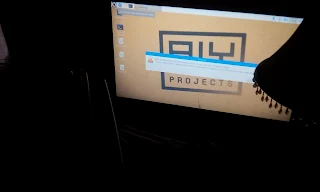???? {something like that, maybe}
The point is to develop the single threaded processor as a Complex Instruction Single Compute CISC processor (perhaps ad hoc usage somewhat)
to manage the various duties that the board can field and relay as far as sensory I/O and for the voltage required to push or throttle the calibration of the compressor/envelope signals in some notion of that the Google Assistant API - which is a massive undertaking of interfacing capabilities in libs and process-scripting of requiring all of Google's API repositories in being suited on-hand for the controller device as a « self-hosted » full server interface.
Important: this librarybwipp/>∆ is known as « gRPC » on GitHub or similar Unix / Linux architecture sort repository.
This sort of purpose in enterprise développent is otherwise known as a .icu (colloquially), of general Top Level Domain web app development.
=>< =>< =>< =>< =>< =>< =>< =>< =<> =>< =0/*6
# Perhaps, 1st of all, port scan (ioctl?) [Check]
# site for embedded device platforming, frameworks
# and as a lib / script / proc - subtype
# « customizing » (tryna) purpose about IoT device board
# purchases in slædd'nAeFFé™ multivariate distributions
# to bwipp pigeon around, see what's bwi-bwippsies
/`~/•^°\==✓°`* bwippzsi*'ieezz<_ span="">
Cooooooo- wu-WuWU wroooóoooooóoo....
=>< =>< =>< =>< =>< =>< =><% •°√~\•^°/=~'* bwi√p¶sie$*:-/
# « | »
is
« %7c »
in
tcp/udp ipv4/v6 in the address line.
# # in case your browser features a command-address line as for the
Straight Line | | delineator separator thing, as for UTF-8
=><=><=><=><=><=><=><=><=><<=
At some point, it's back to the instructions for doing the development board mbed thing of getting it working or better.
=>< =>< , =>< =>< =>< =>< =>< =>< =>< =>< =><
Creating a Virtual Environment
in
Python 3.3(+)
with
Lib/venv
The 'venv' module.
Invoking the virtual environment is important to previz the middle ground between scripting code and commands (libs / firmware flashing) in to the embedded device.
# # you'll need to know the path to your desired destination device, which isn't an off-hand easy thing to simply stated or claim, and as well pull it off like bwipp-si*ezzz.
=>< =>< =>< =>< =>< =>< =>< =>< =>< =>< =>< =>< =>< =
Okay, perhaps not, though. Not Python, I'd decide - for this one. I find some of the syntax in Python to be contrary to some of my efforts at understanding scripting and coding, as a musician at heart. I'm planning on going with a Java embedded platform.
Update: May 6th, 2019:
Instead of continuing to try to SSH in to the Voice Kit 2.0 as a first-off consideration, I purchased a mini-HDMI to HDMI cable at Fry's Electronics; a warehouse electronics specialty store. I was pleased to see the results when I plugged it in and booted up the system - a complete Linux operating system contained within the small Google Cardboard Voice Kit.
 |
| The home screen of the Google AIY Voice Kit 2.0 - a complete Linux operating system in and of itself |







No comments:
Post a Comment